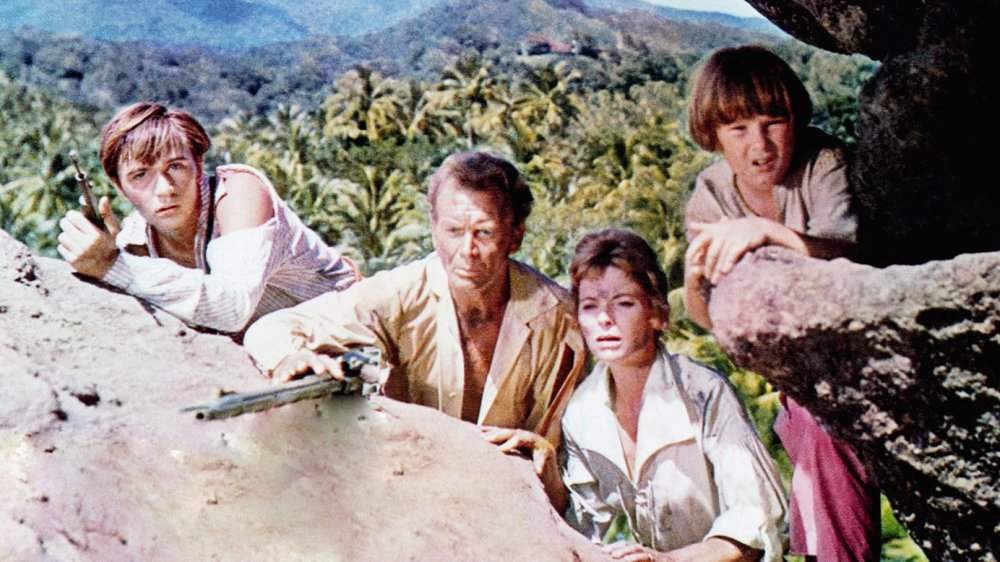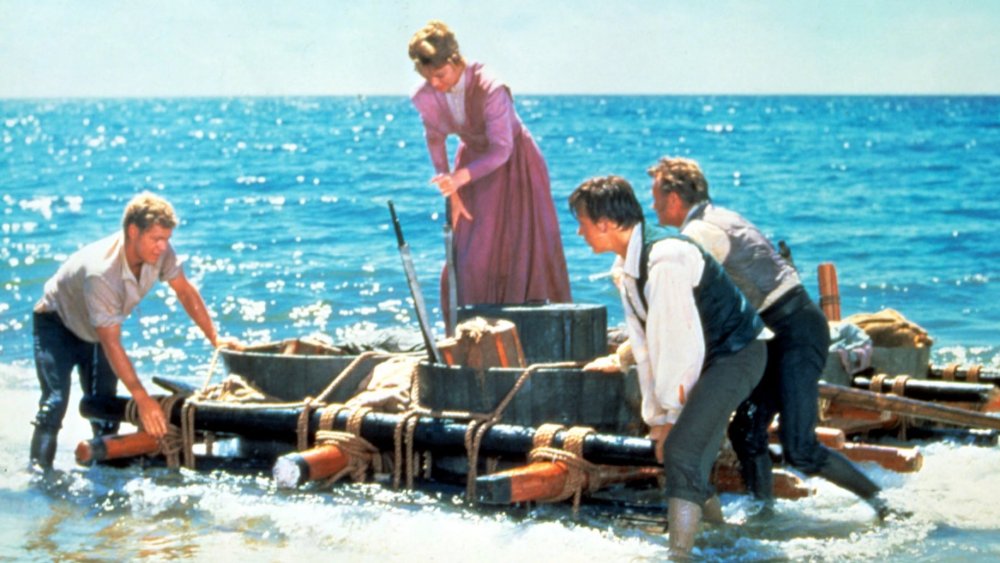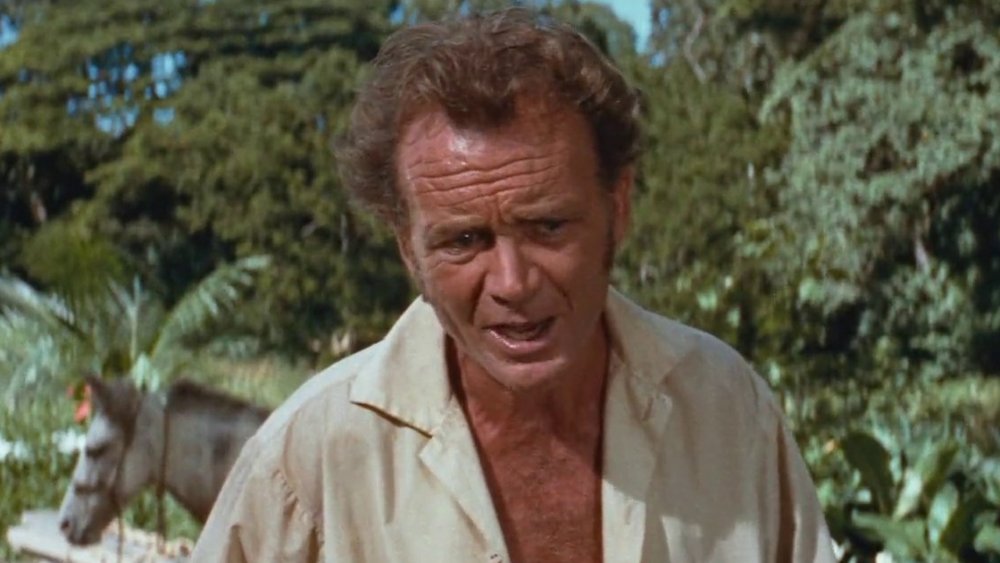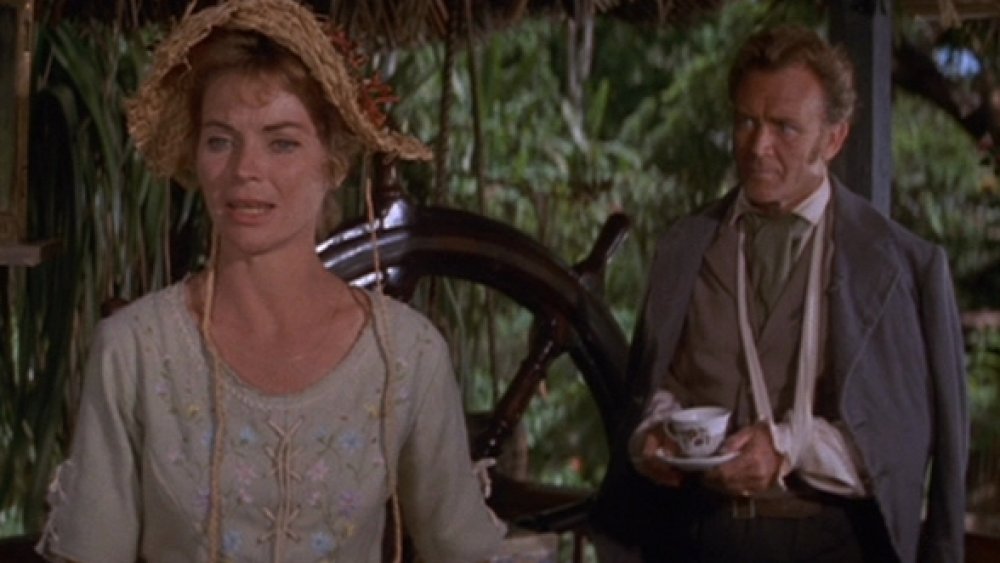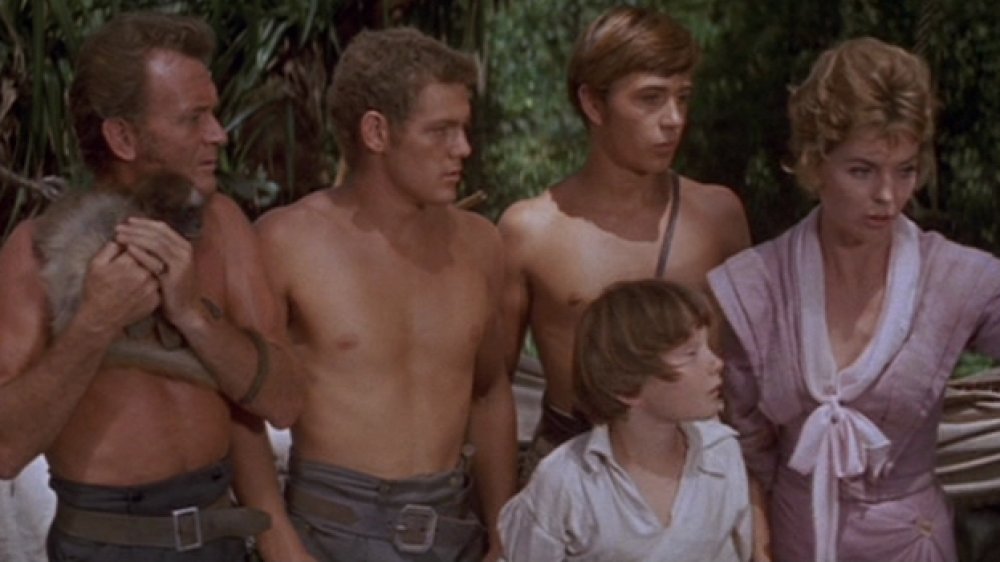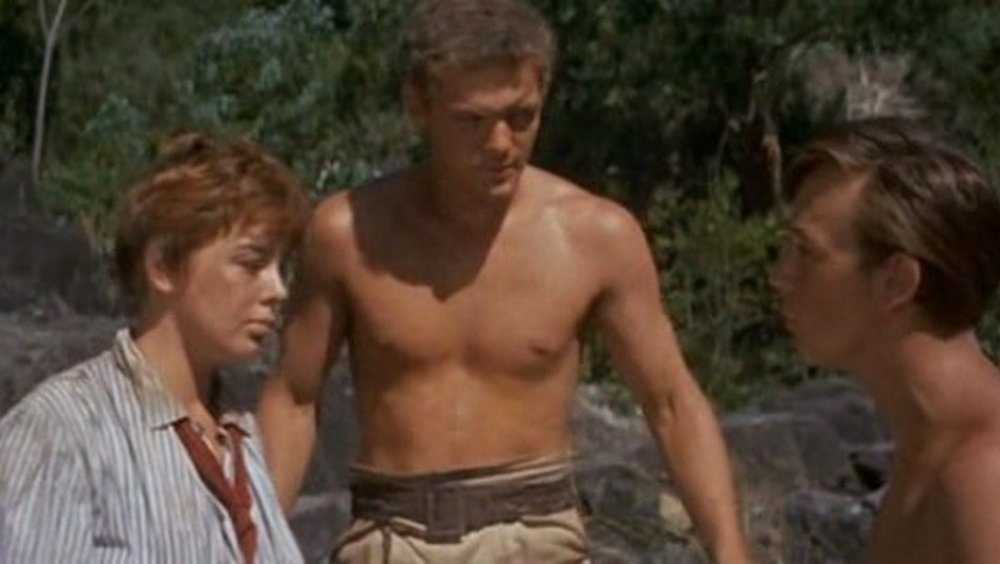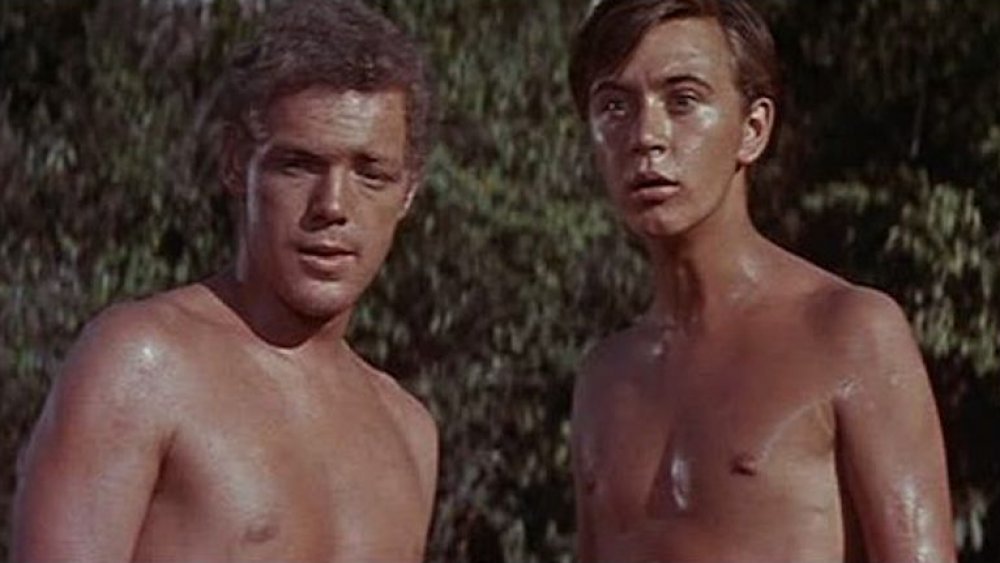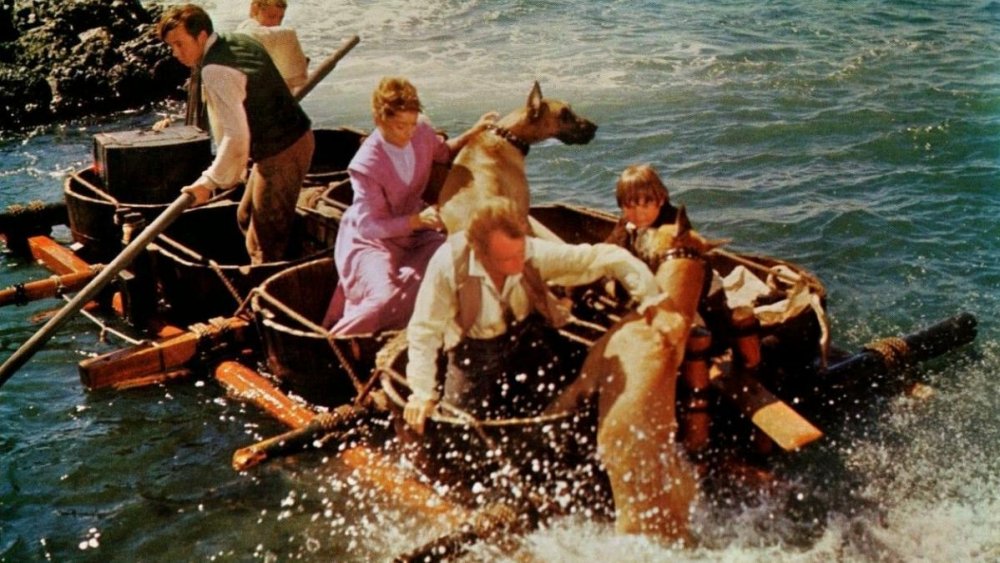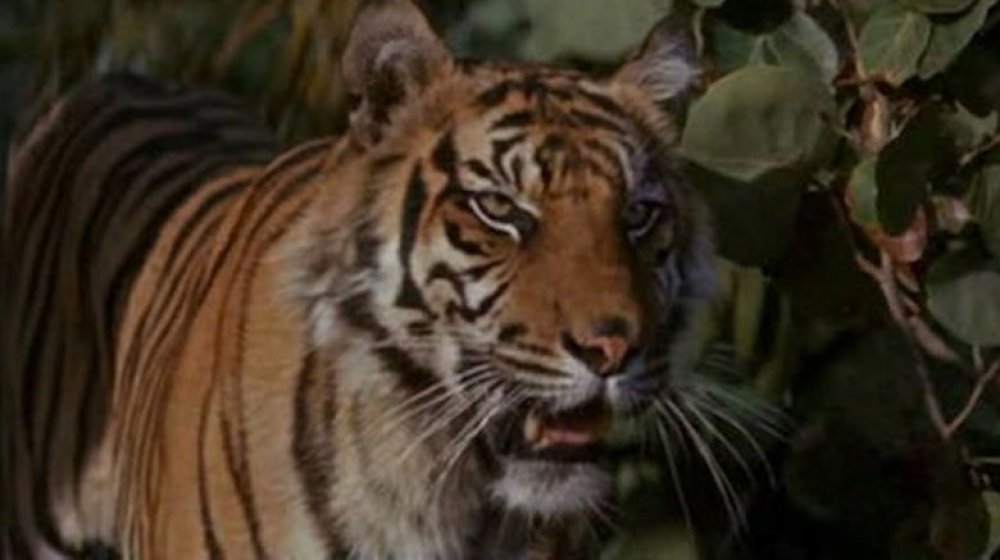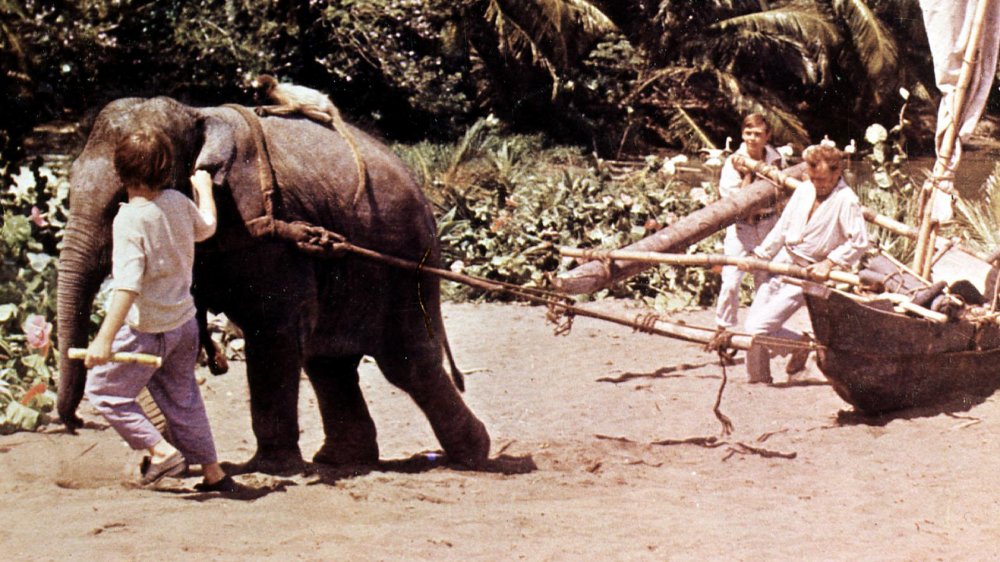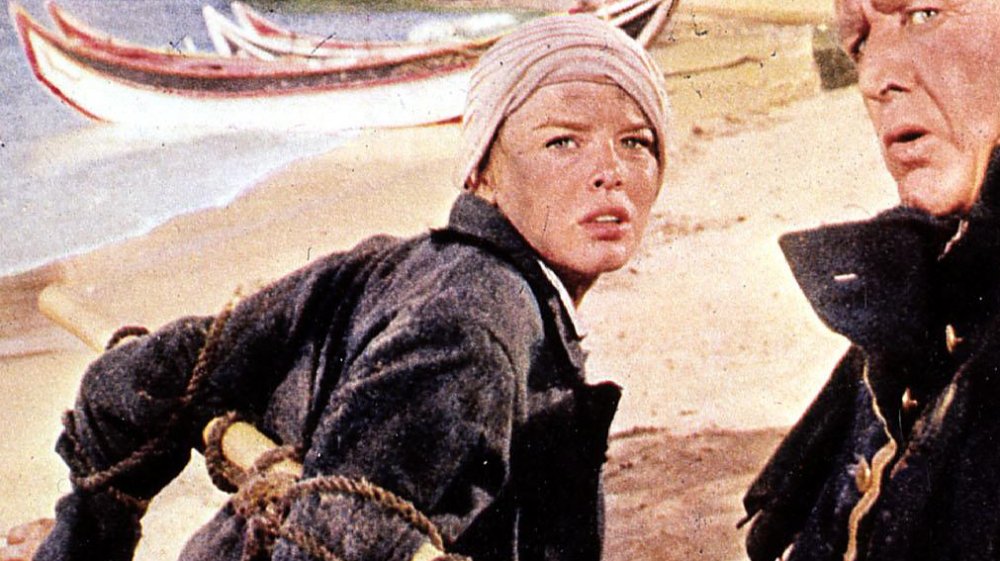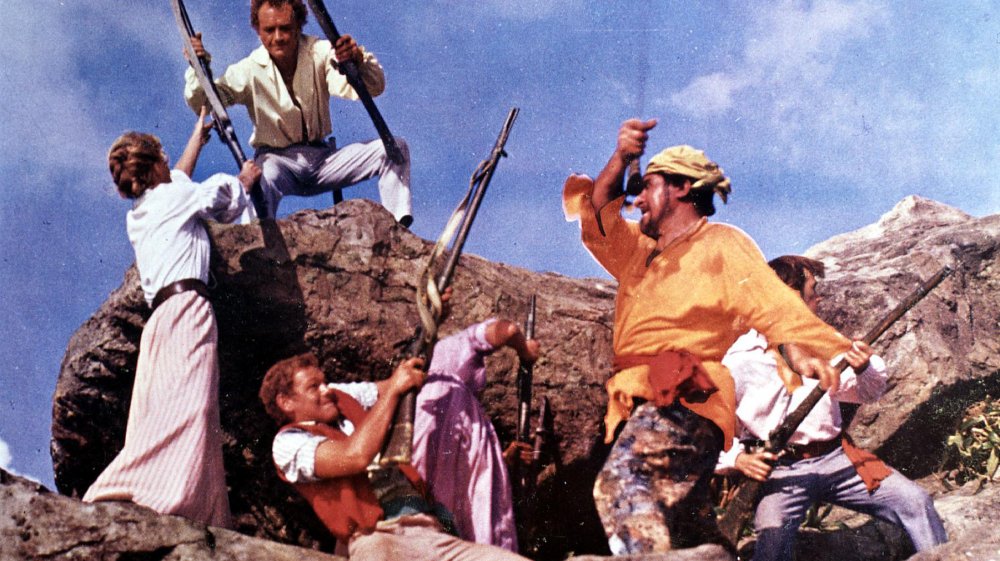Things Only Adults Notice In Swiss Family Robinson
Disney made a lot of live-action movies in the 1960s and 1970s, but few are as fondly remembered as Swiss Family Robinson. The highest-grossing film of 1960, this adaptation of the classic 19th-century novel by Johann David Wyss is one of the most enduring non-animated Disney films, thanks to home video, reruns on cable TV, and the Disney+ streaming service.
But on top of that, Swiss Family Robinson looms so large in the hearts and minds of millions because it offers big, grand, unpredictable adventures while also being relatable. Because for all of the dazzling shipwrecks, pirate chases, tricky sailing trips, and fending off wild animals, Swiss Family Robinson is really just the story of a mostly normal, loving family trying to survive and stay intact, all while relying on each other.
Swiss Family Robinson is also a family film, which means there's something for everyone in it — even adults. Older, more seasoned viewers will notice things the kids don't, be it suggestive material, plot holes, or things that just didn't age very well. Here are the things in Swiss Family Robinson that are totally lost on kids.
Trauma doesn't bother the Swiss Family Robinson
How you describe the events experienced by the Swiss Robinson family in Swiss Family Robinson is all about semantics. A more marketable, exciting, and enticing word for what happens to them on the boat and after they're shipwrecked is "adventure." A more realistic, accurate, and modern-day word for the Robinson saga is "traumatic." Viewed through a sensitive, 21st-century lens, Swiss Family Robinson consists of one harrowing, dangerous, life-threatening, and thus potentially psychologically damaging event after another.
The movie opens with the Robinson family — which includes two teenagers and a little kid — trapped in a tiny room on a ship as it fills with water. They successfully evade drowning by breaking out of their little death trap, but then they face peril and destruction again by building a raft to get off the boat in order to reach land. Things are relatively smooth for a while, and the Robinsons get settled ... until their adopted dogs have to fight off a hungry tiger, and then Ernst (Tommy Kirk) and Fritz (James MacArthur) go on a sailing sojourn to explore the rest of the island and rescue Roberta (Janet Munro) from a gang of bloodthirsty pirates. If the Robinsons were real people, the psychological scars suffered would run deep and would take years of therapy to alleviate. The movie Robinsons, however, aren't real people, and they just roll with the scary and don't seem much worse for the wear. They're relentlessly cheerful, even.
There are a lot of unaddressed dangers
While the Robinsons endure numerous frightening encounters with the sea, pirates, and vicious animals, they don't seem too worried about the things most likely to harm or kill them — which are precisely the things an alert, concerned parent watching Swiss Family Robinson would most certainly notice or think about when assessing how they'd fare on an island, post-shipwreck.
Mother Robinson (Dorothy McGuire) gets awfully nervous when her strong swimming husband and sons are swinging on a vine over a swimming hole, but neither she nor anyone else seems afraid of that unclean water. Father Robinson (John Mills) playfully spits out the water after falling in, and that water is most definitely full of all kinds of germs, bacteria, and the diseases spread by virulent microscopic life. The Robinsons, in all of their survival activities, don't devote any time to water purification, and food doesn't seem to be much of a problem, either. They eat random fruit off trees, which could easily be poisonous, and no responsible parent would allow their kids to sample wild jungle plants. Heck, the Robinsons don't even deal with sunburns. If Swiss Family Robinson were real, those Alpine mountain folk would burn to a crisp and quickly.
Wait, their names are Mother and Father?
When adapting Johann David Wyss' classic novel, Disney filmmakers didn't worry about toning down any of the Swiss references and historical markers. Viewers both young and old understand early and frequently that the Robinsons initially got on a boat bound for New Guinea, departing from their home in Bern, Switzerland, to escape the European conquest of Napoleon Bonaparte, placing the story somewhere around the year 1800. Those unique cultural indicators made the final cut of Swiss Family Robinson, and the boys' names stayed as Swiss-German as they were in the original 1840 novel — Ernst, Fritz, and Francis.
It's noticeable then for adult viewers, by the act of omission, that the Robinson parents' names are never revealed. Their first names are never given because they're never used. In a very formal and outdated way, all the Robinson boys call their mother "Mother" and their father "Father." Not even in one of the handful of scenes when Mother and Father are alone with each other do they slip up and do something so informal as to refer to their spouse by their name instead of their title of parentage. It's more than a little goofy and unsettling.
The accents are all over the place in Swiss Family Robinson
Here's the polar opposite of a spoiler. As the family at the center of Swiss Family Robinson, the Robinsons are from the nation of Switzerland. They're Swiss, in other words, and they discuss their Swissness often and in loving detail. Adults will catch the occasional reference to "Bern," that being the capital city of Switzerland from which the Robinson family presumably hails. Fritz and Ernst discuss their homeland's beautiful mountains and snowy climate, and both have German-sounding names, which fits, because German is one of Switzerland's four official languages, which older viewers may remember from a high school geography class.
Adults may also notice how none of the Robinsons speak in a Swiss accent, and in fact, their vocal characteristics vary wildly. Father speaks with the natural, clipped British accent of the man who portrays him, John Mills, while Mother speaks in a mid-Atlantic dialect — that highly theatrical, vaguely British, mid-20th manner of speech used primarily by actors like Katharine Hepburn. Curiously, all three kids don't sound like they're from Switzerland or England, braying about in their quintessential mid-century American accents.
There seems to be a dress code
Technically, Swiss Family Robinson is a beach movie. There aren't any surfing scenes, bonfire parties, or other tropes found in the genre that was popular around the time of Swiss Family Robinson's initial release in 1960, but it's a film that takes place almost entirely in, on, or around a tropical beach. Adults might assume that characters would be dressed in beach-appropriate attire — shorts, swimsuits, T-shirts, or for the guys, nothing on top. But that's not the case with Swiss Family Robinson, which will amuse and mildly startle adult viewers.
Despite the hot sun beating down, Mother Robinson never appears in anything other than a dress that covers every bit of skin from her neck down to her ankles. The male characters, meanwhile, do take off their shirts, if working in the sun, but they're careful to rarely display their navels. In a strictly modest Disney movie from 1960, showing off a belly button would be downright profane, so most instances of shirtlessness involve the Robinson guys hilariously pulling up their long pants almost up to their chests so as to not flash anything untoward.
Father Robinson has needs
Maybe that mostly enforced dress code placed on the Robinson family is just an attempt to kill any and all throbbing biological urges indicative of teenage boys. Older viewers will notice that multiple male members of the Robinson family have physical needs besides food and shelter on the brain, and they demonstrate it in as explicit a way that a Disney movie from 1960 would allow. After the Robinson guys build their elaborate, multi-part, pulley-enabled network of treehouses, Father whisks Mother up to show her their literal love nest and bedroom. Youngest son Francis (Kevin Corcoran) shouts that he wants to follow his mom up there, only for his knowing brothers to gently hold him back from doing so, to give the married people their space. Father even gives the guys a look that definitely says, "Hey, back off, I'm going to see where this goes," as he follows Mother into the treehouse, where they reminisce about their honeymoon, and everyone but the most little of little kids knows what happens on a honeymoon.
Fritz and Ernst are single and ready to mingle
Quite a bit of euphemism-heavy birds and bees talk permeates Swiss Family Robinson. After a nice day of diving and swimming at an idyllic spot, Father Robinson proclaims his want and intention to never leave the island. It then takes him a moment to figure out exactly what she's saying, but Mother laments how if they were to never get rescued and if they stayed on this island paradise forever, their boys would "never get married" or find themselves wives ... by which she means "succumb to their natural physical needs as men." In a scene that kids would take literally — in that people want to marry other people — Father agrees, in very few words, that this could cause a problem the longer the family stays on the island.
Fritz and Ernst, however, are way ahead of Father on the matter because they're feeling those familiar feelings already. While camping out on the beach during their exploratory sail around their island, Ernst wonders, "Do you think when we get to New Guinea, if we ever do, there'll be any girls our age?" And then Fritz gives a baffling, hormonal, and almost predatory reply with, "By the time we get to New Guinea, we won't care what age they are!"
Where did the Robinsons acquire their survival skills?
The plucky, crafty Robinsons of Swiss Family Robinson are so good at surviving the harsh conditions of a tropical island (and getting off a sinking ship with plenty of supplies) that they make it look easy. Viewers of all ages might watch this movie and think, "Hey, if I crashed on a random island, I could totally survive and thrive, just like the Swiss Family Robinson!" And that includes viewers who have no survival training or experience roughing it in the wilderness — just like the Swiss Family Robinson.
Thoughtful viewers may wonder where and how the Robinsons got so good at living off the land. Through a few statements pieced together, it's established that the Robinsons were a wealthy family from Bern, Switzerland. Mother wears very nice clothes, Fritz and Ernst attended a private school, and they could afford the expensive passage to their once-final destination of New Guinea. The life of a well-to-do group from snowy, landlocked Switzerland doesn't suggest there would be much opportunity to learn the expert-level abilities the Robinsons demonstrate in their tropical paradise. They obviously have such a deep knowledge of plant life that they know what to eat and what to avoid, their raft-making skills are on point, the older boys can spear fish, and the family somehow manages to build the fanciest and most complicated treehouse in world history.
The variety of wildlife in Swiss Family Robinson is silly
Older viewers (and more astute, geographically educated children who listen well) can figure out exactly where the Robinsons in Swiss Family Robinson get shipwrecked and take up residence. They were sailing from Europe to the Indonesia-adjacent island of New Guinea in southeastern Asia. However, even a cursory bit of wildlife knowledge makes it clear to viewers that filmmakers went for less of an accurate take on what sorts of animals and plants would be found on a tiny island in that vicinity and instead embraced a more generalized life-rich island where nearly any cool, exciting, exotic, or photogenic creature could make an appearance.
A baby elephant named Rocky makes a memorable appearance and becomes as much of a pet to the Robinsons as Duke and Turk, the big dogs they save from their ship. Those dogs get into a scrap with a tiger, and the Robinsons later try to save a zebra that gets trapped in what seems to be quicksand. The family also befriends a large turtle and walks by some flamingos and ostriches at one point. Such large and various wild animals aren't generally found all on one island together, adults may point out, only for Swiss Family Robinson to feebly explain this away by suggesting that the island wasn't always an island but was once connected to a continent via some kind of "land bridge."
The animals endure a lot of abuse
Despite the geographical peculiarities and inconsistencies in their depiction, the animals in Swiss Family Robinson are one of the film's biggest attraction points, both in the present day and most certainly when it first hit theaters in 1960, when less media and less zoos and aquariums meant fewer chances to get a glimpse of a tiger, zebra, shark, or sea turtle up close. Generally speaking, kids love and are fascinated with animals, so they'll notice the many fantastic beasts that roam the Robinsons' island home and the ocean around it, but it's the adults who will realize that these animals seemingly didn't have a great time shooting Swiss Family Robinson.
Animals are used as beasts of burden and made to work, and they suffer through some frightening sequences, neither of which are depicted in more contemporary family films. For example, while trying to make land, the Robinsons fight off sharks and successfully get them to back off by shooting at them, and moments later, they marvel at a turtle that winds up towing their heavy boat full of salvaged junk. Add in the drowning and flailing zebra, Francis attempting to violently trap an elephant, and two dogs brutally fighting off a tiger in a scene that goes on for way too long, and Swiss Family Robinson isn't the cute and innocuous movie adult watchers remember from their childhood.
The Roberta situation
There are all kinds of things wrong and shocking about how the character of Roberta is handled in Swiss Family Robinson. Fritz and Ernst discover her in their sailing expedition on another part of their island, taken captive by pirates along with her grandfather. However, at the time, Roberta isn't Roberta — she's just some lowly cabin boy. Her granddad had her wrap her head in a scarf to make the pirates think she's a man, which viewers presume is so they wouldn't kidnap her and do horrible things to her.
And in much the same way that Clark Kent's glasses conceal Superman's identity, in the world of this film, that head wrap somehow makes the pirates and the boys not notice 26-year-old actress Janet Munro's adult, feminine facial features. (However, the Robinson boys do notice that this new friend isn't the most macho of men, and they compare him to a school chum from back home they bullied for being a "sissy.") The guys only figure out Roberta's true identity when her scarf falls off, but then they don't really have a romantic interest in her until their mother gives her a cringe-inducing, ultra-feminine makeover. It's all very dated at best and problematic at worst.
This isn't some obscure island
Probably because of the cultural dominance and popularity of Lost, adults watching Swiss Family Robinson may be predisposed to not accepting a tropical island at face value. As the island from Lost wasn't just some tropical isle where a plane crashed and a bunch of survivors had to make do with limited resources, adults will realize that the seemingly innocuous (if abundant and danger-laden) setting of Swiss Family Robinson is also not at all random or obscure. It's a little contrived that the island witnessed two boating disasters in the same short time frame — the Robinsons crawling ashore after a shipwreck, as well as the pirates who attacked a boat and took Roberta and her grandfather captive. Those same pirates threaten the Robinsons' safety on multiple occasions. This means that if pirates are constantly swirling about the general area, looking for booty, treasure, and whatnot, then this island isn't exactly off the beaten path but right along a major shipping route. It's puzzling that the Robinsons aren't spotted by a friendly seafaring vessel right away.
